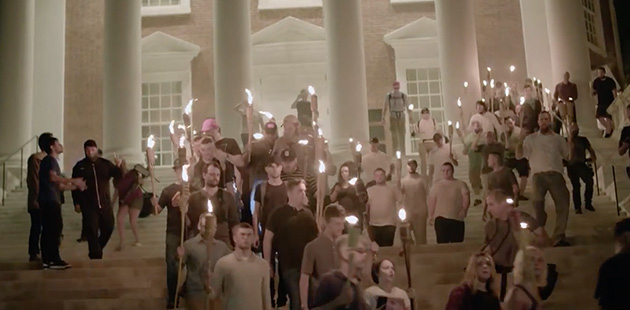Charlottesville: Hearing our pain
What has happened in Charlottesville, VA has been a catalyst for so much pain and anger in our country. We saw very angry white men, some carrying weapons, shouting words that were very painful for many people. We saw physical violence amongst people ending with a car being driven into a crowd injuring many and killing one. We saw a president respond with words that a few found encouraging, but most found lacking the understanding of the pain that was happening. And now there are voices describing all parties involved as ‘guilty’ and crying that violence is not the answer.

That is not helping. Through their pain people hear that kind of language as saying “you are at fault”. They hear it as complacency, as being complicit, as not willing to take a stand. Let me be clear, violence is not the answer, but telling people that isn’t going to help. There is something that will help. It’s a language of the heart developed by Dr. Marshall Rosenberg. It’s not nice; it’s authentic. Dr. Rosenberg developed this language not because violence was “wrong”, but because he knew violence didn’t work. It never works. Not for real change. Dr. Rosenberg has us ask ourselves not only what we want others to do, but also why we want them to do it. That’s very important because if people aren’t making more life-affirming choices because they want to, it won’t be real, it won’t last.
We are seeing that continue to be played out with racism in our country. Many of us are feeling angry and hopeless that something we hoped was changing doesn’t seem to be. Some of us are frustrated that others are just now seeing it hasn’t been changing as fast as we hoped. We didn’t address the “why” when we started pushing for racial justice. We never have. We just keep using shame and blame to push for the change. So people just hide what they really think and use more subtle forms of racism, unless they feel comfortable, and then it pops out again. This is the “politically correct” speech we hear talked about. There are people longing to have the freedom to say what they really believe.
So how do we really get the change we are longing for? Oh, it’s going to be difficult. Really, it is. We have got to give the people that are stimulating so much pain in us empathy. We aren’t doing it to be a “good person”, but because the only way those people are going to hear the pain we are experiencing, the only way they are going to take responsibility for this, is for them to get empathy first.
It’s not like Dr. Rosenberg hasn’t personally experienced this, he has. He once got into a cab and not long after the cab driver got a call about the next fare that needed picked up at a synagogue. The cab driver immediately muttered something about the ‘kikes’ that wanted nothing but to cheat people out of their money.

Here is his response:
“For twenty seconds there was smoke coming out of my ears. In earlier years, my first reaction would have been to want to physically hurt such a person. Instead I took a few deep breaths and then gave myself some empathy for the hurt, fear and rage that was stirring inside me. I attended to my feelings. I stayed conscious that my anger wasn’t coming from my fellow passenger nor the statement he had just made. His comment had triggered off a volcano inside of me, but I knew that my anger and profound fear came from a deeper source that those words he had just uttered. I sat back and simply allowed the violent thoughts to play themselves out. I even enjoyed the image of actually grabbing his head and smashing it. Giving myself this empathy enabled me to focus my attention on the humanness behind the message…I tried to empathize with him, to hear his pain. Why? Because I wanted to see the beauty in him, and I wanted him to fully apprehend what I had experienced when he made his remark.” (Nonviolent Communication: A Language of Life, 3rd Ed.)
So we now need the kind of warriors that have the courage to be with the pain that is happening right now, and then have the ability to give people enough empathy that we can get them to hear and grieve the pain their choices are responsible for. I have no doubt that many if not all of the people espousing white supremacist beliefs are in pain. And I think they believe the choices they are making are the right choices, but they aren’t. There is so much pain out there, and has been. It’s manifesting itself now. Now can be the time for real change. Now can be the time people learn to behave in more life affirming inclusive ways, but do it because they understand when others are in pain, they are as well. They will change because they want to, it will be a change that works for everyone.
This isn’t hiding in complacency; this is stepping out in courage, confronting pain and giving empathy. This is holding people responsible for their thoughts, words and actions. This will in itself be painful, but it will be so much better than what we have already been living in. This isn’t being nice; this is being effective.
Top photo is screenshot from Vice News YouTube video
Heather Schlessman, PhD is a Pediatric Nurse Practitioner who has spent her career either working with or teaching about families. She is also a mother who, like so many other parents, spent years muddling her way raising 3 wonderfully different children, one who happens to be experiencing a disability. Fortunately she has a life partner who muddled along with her. Spending most of her time trying to be perfect, as that would be the safest way to live, she became aware of a desire to be able to see people in a more compassionate way. Little did she know that the person she needed the most compassion for was herself. There is a saying that when you are ready to learn a teacher will appear, and so it was for Dr. Schlessman. She was introduced to the work of Dr. Marshall Rosenberg, the developer of Nonviolent Communication, and her world completely changed. She learned a way to have an intimate connection with herself and others, a way to truly contribute. Her passion now is to help others find their way to a more compassionate life. You can find more of Dr. Schlessman’s empathic expressions along with her husband’s, Rev. Mark Schlessman on their website.

